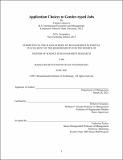Application Choices to Gender-typed Jobs
Author(s)
Labuzova, Tatiana
DownloadThesis PDF (778.0Kb)
Advisor
Fernandez, Roberto
Terms of use
Metadata
Show full item recordAbstract
While most research explaining the persistence of gender inequality has focused on evaluator biases, a growing body of work points to mechanisms that may arise before the hiring process starts. Job seekers decide to apply to particular areas and job levels based on their mental models. Anticipated discrimination and biased self-assessment can result in male and female applicants using different criteria for putting themselves forward to seek jobs. Using a survey vignette study, I find that women and men differ in their application decisions. Women aren't avoiding male-typed jobs, but men are avoiding female-typed jobs. In terms of anticipated discrimination, while there is no gender difference for male-typed jobs, for female-typed jobs, men compared to women anticipate a less favorable employer reaction to their application if they were to apply. However, the expectation of how appropriate the potential employer will find their application is more important for women in their decision to apply to female-typed jobs, whereas men are less likely to incorporate anticipated employer reactions into their application decisions. In terms of biased self-assessment, women report no less confidence than men in their ability to perform well at male-typed jobs, whereas men report less confidence than women in their ability to perform well at female-typed jobs. Further, women and men are similar in the extent to which they incorporate self-assessment considerations into their application decisions. I conclude with a discussion of the study's theoretical and practical implications regarding the design of application processes and further research contributing to the solution-oriented streams of the gender-sorting literature.
Date issued
2021-06Department
Sloan School of ManagementPublisher
Massachusetts Institute of Technology